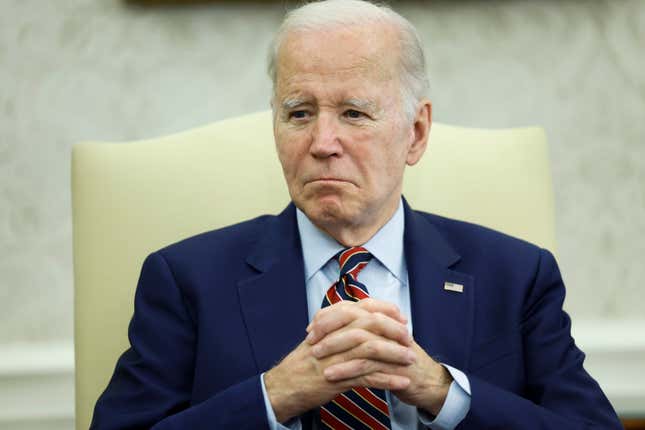
Updated 05/13/2023 at 10:30 a.m. ET
President Joe Biden is entering the election cycle with a problem. His approval ratings have hit a new low, and his support among Black Americans, who arguably handed him the last election, appears to be slipping.
The latest Economist/YouGov Poll from last week found that only 46 percent of Black adults want Biden should run for President again. He did better in overall favorability ratings; 71 percent of Black adults said they had a favorable opinion of Biden. However, in the most recent Associated Press-NORC Center for Public Affairs Research Poll, 58 percent of Black adults said they approved of Biden, and only 55 percent said they would support him in the general election.
While he’s still maintaining mostly positive numbers, it’s a far cry from when he first stepped into the oval office. When the Associated Press-NORC Center spoke to Black adults after Biden’s first month, his approval rating was roughly 90 percent among Black adults. The Root sat down with experts to try to explain why Biden appears to be slipping among Black Americans.
Did Inflation Hurt Biden Among Black Voters?
A few things are at play with Biden’s drop in support, says Nina Smith, a political strategist and former senior advisor to Stacey Abrams. And inflation is way up there, she says.
“I think inflation or at least the perception of inflation is really impacting people,” Smith, adding that some of that is beyond politicians’ control.
Earlier in the year, The Root wrote about how high inflation rates could negatively impact his standing among Black Americans:
Skyrocketing inflation rates have been devastating for Black Americans. In August, roughly 55 percent of Black Americans told NPR that they were facing financial difficulties.
Despite the fact that Presidents often have limited control over things like inflation, Biden’s poll numbers among Black Americans took a noticeable hit at the beginning of the summer as prices of everyday household items surged. Although he did regain much of his popularity closer to the midterms.
Ohio State Professor Hasan Kwame Jeffries says that Biden could help himself if he acknowledged the extent to which corporations price gouging consumers fanned the crisis.
“If he comes out against price gouging,” says Jeffries. “I think that will mitigate some of the blame he’s receiving for not doing enough to reduce inflation.”
What Do Black Voters Want to See From Biden?
Inflation is only one piece of the puzzle. Failure to deliver on key promises like student loan forgiveness has also come back to bite Biden, explains Smith. “If you promise something, you wanna make sure that you can deliver on it,” she says.
Biden’s large-scale loan forgiveness plan is currently stalled at the Supreme Court, which seems unlikely to rule in the administration’s favor. Smith says that engaging with voters about what is and isn’t possible is critical.
“If you have a conversation with a voter and say listen, I support student loan forgiveness, the practicality of it happening right now may not be possible. But if we elect the Congress, this is how it could work,” Smith. “I think that sort of civic education can really be important.”
What Do Biden’s Low Poll Numbers Mean For the Election?
Democrats can’t treat Black voters like our support is guaranteed, says Smith. That means they have to be able to clearly explain how their policies impact Black Americans, she says, which thus far has been a struggle for them.
“Black voters and voters of color are persuasion voters, in terms of voter behavior,” says Smith. “Yes, they have a propensity to support Democrats. But the real persuasion is getting them to show up on election day.”
Jeffries says he isn’t sure these numbers will translate into how Black voters act at the polls in 2024. And he cautions against trying to read too much into them at this point, especially before high-profile supporters of his like the Obamas get a chance to stump for him again.
“I think the numbers will go back up as the campaign touts some of the things that he has actually accomplished,” says Jeffries. “I don’t think they have necessarily done a very good job at that. So, as the campaign rolls out... I’m pretty confident that those numbers will creep up again.”

